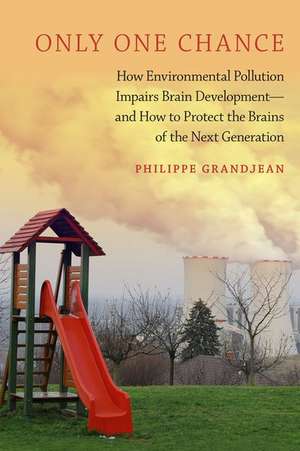Only One Chance: How Environmental Pollution Impairs Brain Development -- and How to Protect the Brains of the Next Generation: Environmental Ethics and Science Policy Series
Autor Philippe Grandjeanen Limba Engleză Paperback – 30 iul 2015
Preț: 241.54 lei
Preț vechi: 274.82 lei
-12% Nou
Puncte Express: 362
Preț estimativ în valută:
46.22€ • 48.39$ • 38.24£
46.22€ • 48.39$ • 38.24£
Carte tipărită la comandă
Livrare economică 25-31 martie
Preluare comenzi: 021 569.72.76
Specificații
ISBN-13: 9780190239732
ISBN-10: 0190239735
Pagini: 232
Dimensiuni: 231 x 152 x 18 mm
Greutate: 0.34 kg
Editura: Oxford University Press
Colecția OUP USA
Seria Environmental Ethics and Science Policy Series
Locul publicării:New York, United States
ISBN-10: 0190239735
Pagini: 232
Dimensiuni: 231 x 152 x 18 mm
Greutate: 0.34 kg
Editura: Oxford University Press
Colecția OUP USA
Seria Environmental Ethics and Science Policy Series
Locul publicării:New York, United States
Recenzii
Only One Chance shaves off layer after layer of ignorance, naivete, and corruption as it exposes the hidden dangers from industrial chemicals. Grandjean's book reads like a thriller and gives us a unique chance to decide that the next generation's brains must be protected against toxic brain drainers.
This is an exceptionally interesting book. Grandjean presents and interprets extensive research on the impact of common chemicals present in the environment on human neurodevelopment using an original and holistic point of view and introducing the concept of 'chemical brain drain'. This is an innovative approach underlining the cumulated and long term impact on the brain of different chemical exposures. Grandjean argues that brain drain hampers the very capacity of human society to progress if its most precious resource, the brain, is not adequately protected. The accuracy of the review, the analysis of the interaction between brain development and society, the approaches to dealing with uncertainties and action, make this book fundamental reading for medical and public health professionals, students, and policy makers. I am convinced it will set a new standard for public health action and research for the coming years.
This book is a huge gift to humankind from an eminent scientist. Grandjean tells the truth about how we have been ruining the brain power of each new generation and asks if there are still enough intelligent people in the world today to reverse the problem. I cannot rid myself of the idea that too many brains have been drained and society is beyond the point of no return. We must learn from the follies and scandals that Grandjean reveals and stop the chemical brain drain before it is too late.
[Only One Chance] is factual, rationally developed, and nuanced, without pulling punches. It argues for a social conscience, adequate premarket research, communication, and regulation. Chemical damage to the developing brain is not destiny. Grandjean explains why and how society must intervene to prevent exposures now and in the years ahead. Highly recommended.
This is an exceptionally interesting book. Grandjean presents and interprets extensive research on the impact of common chemicals present in the environment on human neurodevelopment using an original and holistic point of view and introducing the concept of 'chemical brain drain'. This is an innovative approach underlining the cumulated and long term impact on the brain of different chemical exposures. Grandjean argues that brain drain hampers the very capacity of human society to progress if its most precious resource, the brain, is not adequately protected. The accuracy of the review, the analysis of the interaction between brain development and society, the approaches to dealing with uncertainties and action, make this book fundamental reading for medical and public health professionals, students, and policy makers. I am convinced it will set a new standard for public health action and research for the coming years.
This book is a huge gift to humankind from an eminent scientist. Grandjean tells the truth about how we have been ruining the brain power of each new generation and asks if there are still enough intelligent people in the world today to reverse the problem. I cannot rid myself of the idea that too many brains have been drained and society is beyond the point of no return. We must learn from the follies and scandals that Grandjean reveals and stop the chemical brain drain before it is too late.
[Only One Chance] is factual, rationally developed, and nuanced, without pulling punches. It argues for a social conscience, adequate premarket research, communication, and regulation. Chemical damage to the developing brain is not destiny. Grandjean explains why and how society must intervene to prevent exposures now and in the years ahead. Highly recommended.
Notă biografică
Philippe Grandjean is Professor and Chair of Environmental Medicine at the University of Southern Denmark and Adjunct Professor of Environmental Health in the Department of Environmental Health at Harvard School of Public Health. He has devoted his career to studying how environmental chemicals affect children and their brain development. His studies on mercury triggered an international response that led to a United Nations agreement to control mercury pollution. He has studied children in the U.S. and Denmark, in the Faroe Islands, and countries in South America and Asia, and he has published more than 500 scientific papers on his findings.














